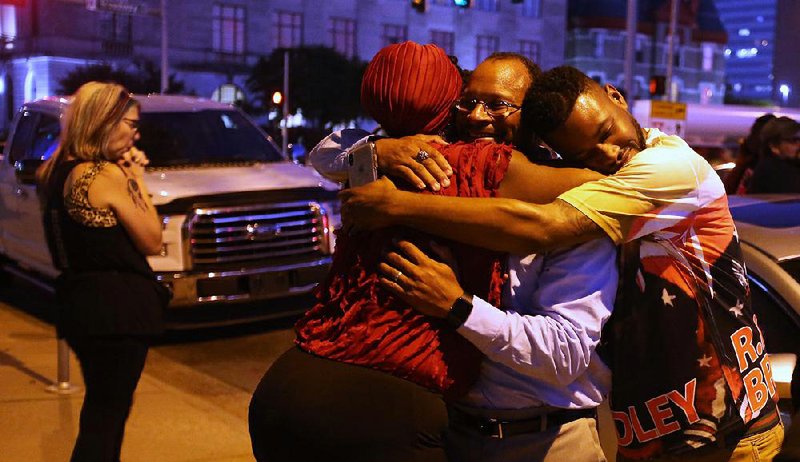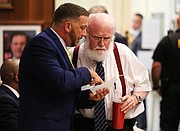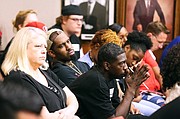The Little Rock Civil Service Commission voted Wednesday to uphold the termination of a Little Rock police officer who was fired after a fatal shooting earlier this year.
Charles Starks, who was fired on May 6 for violating a department policy during the shooting of Bradley Blackshire, will appeal his termination again, the next time in Pulaski County Circuit Court, his attorney said after Wednesday's hearing.
Starks was fired after an internal investigation found that he had violated department policy on Feb. 22, when he shot Blackshire eight times during a traffic stop, killing him. Blackshire, who was driving a stolen vehicle, struck Starks twice with the vehicle, injuring the officer's knee.
More than a dozen witnesses testified in the 15-hour, two-day hearing, which began on July 25 and continued Wednesday. After more than seven hours of testimony and an hour of deliberation Wednesday, the commission -- in a voice vote -- upheld the Police Department's decision to fire Starks.
[Video not showing up above? Click here to watch » https://www.youtube.com/watch?v=CUGWcDX96h8]
The vote, after commissioners held an hourlong closed session, took less than five minutes, and commissioners gave no explanation of their decision.
Only commissioner Jeff Hildebrand voted against upholding Starks' firing.
Multiple commissioners declined to comment about their decision after the meeting. Several commissioners said throughout the hearings that they were concerned about the divisions and distrust officers displayed in their leadership.
When this newspaper asked one commissioner if she still harbored those concerns, the commissioner sighed, turned around and walked away.
Wednesday's decision was met with cheers from the side of the boardroom where Blackshire's family had sat and waited for more than eight hours, and silence from Starks' family and friends.
Allegations that Little Rock Mayor Frank Scott Jr. pressured the Little Rock Police Department to swiftly investigate and terminate Starks resurfaced multiple times in the second day of the hearing. In the first day of the hearing, Assistant Police Chiefs Hayward Finks and Alice Fulk testified that Scott had pressured the department beginning on the day of the shooting.
As a last-minute rebuttal witness, the Police Department's attorney called to the witness stand Assistant Chief Wayne Bewley, who was interim chief at the time of Blackshire's death.
Bewley testified that Scott had not asked if Starks could be immediately fired to insinuate that the officer should be, but rather because the mayor had only recently taken office and did not understand how internal investigations work.
"It was him getting some education from me, who was in the place of the interim chief at the time," Bewley said. "The pressure that the mayor put on me was 'we have to get the video released.' I said in order for us to get this released, we have to get the file done.
"The mayor was very adamant about wanting to release the dash cam video for transparency," Bewley said. "He said he ran his campaign on transparency, and he was adamant that we get this out there."
Attorney Robert Newcomb, representing Starks, called to the witness stand multiple members of Starks' chain of command, as well as training officers and a former internal investigator.
Retired Sgt. James Stephens, the officer who completed the internal investigation into the shooting, said Bewley told him Scott wanted the internal file completed quickly.
"Chief Bewley told me that -- I'm paraphrasing what he said but -- the mayor's office wanted this completed quickly," Stephens said early Wednesday morning. "He cautioned the mayor that he needed to let due process [take its course]. That's basically why I was told to rush it up."
Pulaski County Prosecuting Attorney Larry Jegley wrote in an April 19 letter that Starks had been justified in the shooting, saying the officer was in fear of his life when Blackshire drove the stolen vehicle toward him in a parking lot near West 12th Street and South Rodney Parham Road.
Stephens said the internal investigators normally start an investigation after the prosecuting attorney's office passes down its decision whether to prosecute. Instead, Bewley asked Stephens to have the investigation ready 24 hours after Jegley announced that he would not charge Starks.
Sgt. Harold Scratch, a 25-year veteran of the Little Rock Police Department, said during testimony that he was given the internal investigation on a Wednesday afternoon and asked to have a decision prepared by the following Monday.
"I was asked to make a recommendation for discipline for the officer when I did not take part in the investigation," Scratch said. "I haven't encountered something like that. I've never been told to write a disciplinary recommendation for a deadly force shooting."
Capt. Heath Helton, a supervisor in Starks' chain of command, said when he received the investigative file from internal affairs he was told that the violation had "already been sustained."
Helton, who has been with the department for 23 years, said he has never received an internal investigation in which the allegation had already been sustained. Normal practice is for each officer in the chain of command to decide whether they believe there was a violation of department policy.
Helton also said he received the file on a "Wednesday or Thursday" and was told to have his decision ready by Monday.
"We were told that the allegation made against Starks had already been sustained, and all we needed to consider was disciplinary action," Helton said.
Helton told Finks that he was concerned about making a decision in such a short time.
"I didn't like the idea for deciding discipline for something that had already been sustained that I hadn't had a chance to review," Helton said.
Helton was later given more time to review the file and said he was able to make his own decision as to whether the violation was sustained.
He, along with every other member of Starks' chain of command except Chief Keith Humphrey, recommended no disciplinary action. Humphrey, who has the final say in hiring and firing decisions, opted to terminate Starks.
"For 38 years I've been appearing before this commission," Newcomb said in his closing statements. "This is the very first time I've ever had a situation where the entire chain of command has said that somebody should be exonerated and the punishment was the death penalty ... meaning termination."
In the city's closing arguments, attorney Khayyam Eddings did not focus on whether Starks had violated department policy, but instead tried to convince commissioners that the mayor had not influenced the investigation.
"They wanted you all to believe that the mayor wanted him fired without due process and that he was going to go out and find a police chief that would fire him," Eddings said.
"The fact of the matter is there hasn't been one witness here with one shred of support for that allegation ... and I think that's unfair to the mayor."
Throughout the hearing, attorneys played and replayed video footage from the shooting. Every time they replayed the video -- more than 5 times before 10:30 a.m. -- Blackshire's mother, Kimberly Blackshire-Lee, looked down and away from the screen. She put her hand over her face and closed her eyes tight.
Attorneys delved repeatedly into the minutia of Starks' actions in the seconds before the shooting, questioning where he positioned himself in relation to the vehicle, where he moved when the car began to roll, and primarily, how he walked in front of the vehicle in what Newcomb said was an attempt to reach cover.
The city's attorneys, Eddings and Mike Moore, went through several traffic-stop guidelines point-by-point, asking whether Starks' actions abided by the policy.
Eddings, playing the video, pointed out to each witness that Starks did not notify the other responding officer of the possible presence of a gun until the car's passenger, Desaray Clarke, 21, says Blackshire has a gun. If Starks truly believed Blackshire had a gun, Eddings said, wouldn't he warn the responding officers?
Newcomb asked almost every witness what they would have done in Starks' position. Would they have moved backward, to the side? Would they have run away?
Some witnesses said they would not have approached the car in the same way. Others said they saw nothing wrong with how Starks treated a potentially violent situation.
Stephens testified that, while it was not wrong, Starks should not have moved in front of the moving vehicle, saying the former officer placed himself in more danger than had he stepped to the side or away.
"He was reasonable in his perception that the guy might have had a gun," Stephens said. "But he put himself in danger of two deadly force situations."
At the end of the hearing, a cheering, laughing crowd of Blackshire's family and friends walked out of City Hall, its members hugging on the sidewalk near West Markham Street.
A smaller crowd of Starks' relatives and supporters filed out using a back stairwell, followed by police guards as its members made their way to the parking lot.
CORRECTION: Little Rock Civil Service Commission member Jeff Hildebrand voted against upholding former Little Rock Police officer Charles Starks’ termination in a voice vote on Sept. 4. An earlier version of this story mischaracterized Hildebrand’s vote.
Metro on 09/05/2019


